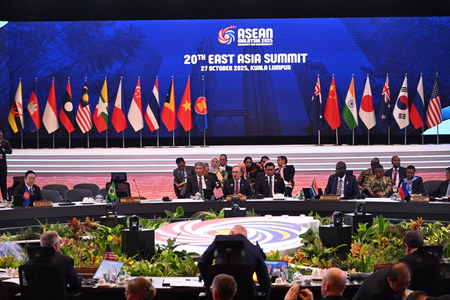Kuala Lumpur Declaration adopted at 20th East Asia Summit, reaffirms commitment to peace, stability

Kuala Lumpur, Oct 28 (IANS) The Kuala Lumpur Declaration reaffirmed the participating countries’ unwavering commitment to the 2005 Kuala Lumpur Declaration on the East Asia Summit, which laid down the broad vision, principles, objectives, and modalities of the EAS.
It further reiterated their dedication to the 2010 Ha Noi Declaration commemorating the fifth anniversary of the EAS, the 2015 Kuala Lumpur Declaration marking the tenth anniversary, and the 2020 Ha Noi Declaration celebrating the fifteenth anniversary.
The declaration recognised that the world and the region are currently facing numerous geopolitical tensions and conflicts, along with economic uncertainties, security threats, and other transboundary challenges. It emphasised that these issues require collective collaboration and joint efforts to ensure lasting peace, social development, and economic progress for all.
Reaffirming the region’s shared commitment to the purposes and principles enshrined in the Charter of the United Nations, the ASEAN Charter, and the Treaty of Amity and Cooperation in Southeast Asia (TAC), the declaration also cited the 2005 Kuala Lumpur Declaration on the East Asia Summit and the 2011 Declaration of the East Asia Summit on the Principles for Mutually Beneficial Relations (the Bali Principles) as “vital foundations” for continued cooperation and trust-building among member states.
The declaration further supported ASEAN’s unity and centrality within ASEAN-led mechanisms, reaffirming ASEAN as the driving force within the East Asia Summit. It called for close partnerships with other participating countries to promote strategic trust and to ensure transparent, predictable, and responsible behaviour in regional and international affairs.
Acknowledging the considerable progress achieved by the East Asia Summit over the past 20 years, the declaration called for the further strengthening of the EAS based on its established principles and objectives.
It further expressed the collective desire to foster a peaceful environment conducive to deeper cooperation and stronger bonds of friendship among EAS participating countries, guided by the principles of equality, partnership, consultation, and mutual respect.
Through these efforts, the EAS aims to contribute meaningfully to peace, stability, and prosperity not only in the region but also globally.
The declaration also recognised the respective and complementary roles of the EAS Foreign Ministers in providing policy guidance, the EAS Senior Officials in ensuring policy coordination and follow-up, and the Group of East Asia Summit Ambassadors in Jakarta as vital mechanisms for ongoing engagement and dialogue.
Additionally, the EAS Unit within the ASEAN Secretariat was acknowledged for providing institutional support and continuity, all of which contribute to strengthening the EAS framework.
These mechanisms were commended for supporting the effective implementation of EAS Leaders’ statements, declarations, decisions, and initiatives, as well as the EAS Plan of Action (2024–2028).
The declaration also emphasised the importance of exchanging information on regional development cooperation, security policies, and discussions on the evolving regional architecture.
On this significant 20th anniversary, the Kuala Lumpur Declaration reaffirmed the EAS’s role at the apex of the ASEAN-centred regional architecture. It highlighted that the Summit remains a Leaders-led forum for dialogue and cooperation on broad strategic, political, and economic issues of common interest and concern, with the overarching aim of promoting peace, stability, and economic prosperity across East Asia.
The declaration stated that the EAS is committed to enhancing dialogue and upholding international law in the region. It underscored the importance of mutual understanding, respect, trust, and friendship, as well as the peaceful settlement of differences and disputes in accordance with international law.
It called upon all nations to work together to maintain, promote, and sustain peace, stability, and prosperity in East Asia.
Reaffirming its strong commitment to multilateralism based on international law, including the Charter of the United Nations, the declaration described this foundation as indispensable for building a more peaceful and prosperous world.
The EAS also pledged to continue promoting and upholding international law and the principles outlined in the 2011 Bali Principles, which guide mutually beneficial relations among member countries.
The declaration further emphasised the importance of the EAS as an avenue for constructive, candid, and open dialogue as well as practical cooperation. It stated that the EAS process should remain positive, dynamic, and beneficial to ASEAN and the broader region, ensuring long-term utility and relevance.
It also reaffirmed that with ASEAN playing a central role, the East Asia Summit would enhance economic cooperation among participating countries. This would focus on areas of mutual interest to bolster regional resilience against economic challenges, promote sustainable development, and reduce development gaps among nations in the region.
To further strengthen the East Asia Summit, the declaration outlined several concerted efforts and measures, including maintaining the informal nature of the EAS, cooperation in joint activities and projects, and advancing implementation of the EAS plan of action.
It also reaffirmed support for ASEAN’s continuous efforts to mainstream and implement the ASEAN Outlook on the Indo-Pacific (AOIP). The declaration emphasised that the AOIP is designed to enhance the ASEAN Community-building process, while strengthening and complementing cooperation with external partners.
In conclusion, the Kuala Lumpur Declaration on the Twentieth Anniversary of the East Asia Summit reaffirmed the participating nations’ collective vision of a peaceful, stable, and prosperous East Asia, built on the foundations of dialogue, mutual respect, and cooperation.
It reiterated that through shared commitment, respect for international law, and adherence to ASEAN’s centrality, the EAS would continue to serve as a cornerstone of regional peace and progress.
–IANS
jk/sd/





